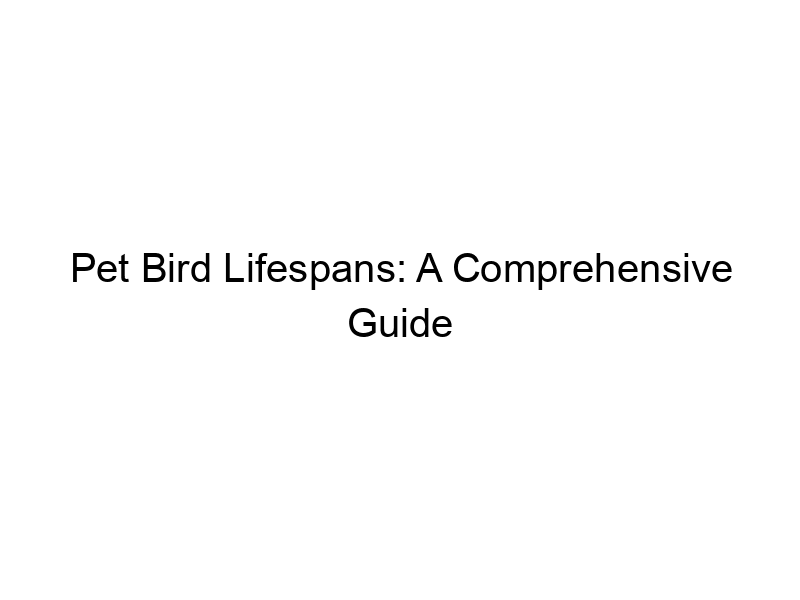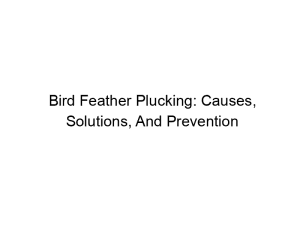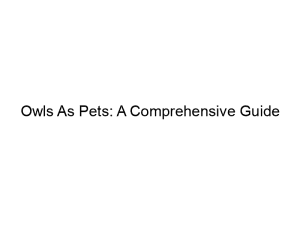How Long Do Pet Birds Live? A Lifespan Guide for Different Species This comprehensive guide explores the lifespans of various pet bird species, providing valuable insights for both novice and experienced bird owners. We’ll delve into factors affecting lifespan, discuss specific species, and offer tips for ensuring your feathered friend enjoys a long and healthy life. You’ll learn about average lifespans, potential health issues, and the importance of proper care to maximize your bird’s years with you.
The lifespan of a pet bird varies dramatically depending on the species. Some smaller species might live for a decade, while larger parrots can easily live for several decades, even exceeding 80 years in some cases. Understanding these differences is crucial for responsible pet ownership, as it dictates the long-term commitment involved.
Several factors contribute to a bird’s lifespan. Proper nutrition
plays a vital role; a balanced diet rich in fruits, vegetables, and appropriate birdseed mixes is essential. Environmental factors, including cage size, cleanliness, and exposure to toxins, also significantly impact longevity. Genetic predisposition and access to quality veterinary care are equally important considerations.
Small Parrots: Lifespan and Care
Budgies (Parakeets):
Budgies, popular for their vibrant colors and playful nature, typically live for 5-8 years, though some may reach 10 years with excellent care. Providing a spacious cage, ample toys for mental stimulation, and a nutritious diet are key to their longevity.
Cockatiels:
Cockatiels, known for their gentle nature and charming crests, have an average lifespan of 15-20 years. They require a large cage, regular interaction, and a diet that includes pellets, seeds, and fresh fruits and vegetables.
Medium-Sized Parrots: Lifespan Considerations
Conures:
Conures are vibrant, active birds with lifespans ranging from 20-30 years. Their intelligence and playful personalities require enriching environments with plenty of toys and social interaction. A varied and nutritious diet is essential for their health and longevity.
Lovebirds:
Lovebirds, as their name suggests, are highly social birds that thrive in pairs. They generally live for 10-15 years, but proper care can extend their lifespan. Providing a suitable cage, a balanced diet, and plenty of interaction is crucial for their well-being.
Large Parrots: Long-Term Commitment
African Greys:
African Grey parrots are highly intelligent and known for their exceptional talking abilities. These birds can live for 40-60 years, demanding a substantial commitment from their owners. Enrichment activities, social interaction, and a consistent routine are essential for their mental and physical health.
Amazons:
Amazons are known for their vibrant plumage and playful personalities. Their lifespans typically range from 40-60 years, similar to African Greys. They need spacious cages, a stimulating environment, and regular veterinary care to thrive.
Macaws: Majestic and Long-Lived
Macaws, among the largest parrots, are renowned for their breathtaking colors and impressive size. These birds can live for 50-80 years, making them a lifetime commitment. Providing a large cage, a diverse diet, and regular veterinary checkups is crucial for their health and longevity.
Other Bird Species and Lifespans
Canaries:
Canaries, known for their melodious songs, typically live for 5-10 years. Providing a spacious cage, appropriate lighting, and a nutritious diet are essential for their well-being.
Finches:
Finches are small, colorful birds that are often kept in flocks. Their lifespan typically ranges from 3-8 years. Providing a suitable cage with ample space for multiple birds, proper diet, and regular cleaning is essential.
Impact of Diet on Bird Lifespan
A balanced and nutritious diet is paramount to a bird’s longevity. A diet solely consisting of seeds can lead to nutritional deficiencies, whereas a varied diet comprising pellets, fruits, vegetables, and appropriate supplements will significantly contribute to a healthy lifespan.
Environmental Enrichment and Longevity
Providing a stimulating environment is crucial for a bird’s mental and physical health. Toys that encourage foraging, climbing, and problem-solving can help prevent boredom and enhance their well-being, ultimately contributing to a longer life.
Veterinary Care: A Crucial Factor
Regular veterinary checkups are essential for early detection and treatment of any health issues. Prevention is key, and proactive care can significantly extend your bird’s lifespan.
Common Health Issues Affecting Bird Lifespan
Various health issues can impact a bird’s lifespan, including feather plucking, bacterial infections, and nutritional deficiencies. Early diagnosis and treatment are crucial for a positive outcome.
Comparing Lifespans Across Different Species
| Species | Average Lifespan (Years) |
|---|---|
| Budgie | 5-8 |
| Cockatiel | 15-20 |
| Conure | 20-30 |
| African Grey | 40-60 |
| Macaw | 50-80 |
Choosing the Right Bird for Your Lifestyle
Before bringing a bird home, consider your lifestyle and the long-term commitment involved. Large parrots, with their exceptionally long lifespans, require a significant time investment and may not be suitable for everyone.
Responsible Bird Ownership
Responsible bird ownership involves understanding the specific needs of your chosen species, providing a suitable environment, and committing to their long-term care. This includes regular cleaning, a nutritious diet, and access to quality veterinary care.
The Importance of Social Interaction
Many bird species are highly social and require interaction with humans or other birds. Lack of social interaction can lead to behavioral issues and negatively impact their well-being and lifespan.
Long-Term Costs of Bird Ownership
Owning a bird, especially a long-lived species, involves significant long-term costs. These include the initial purchase price, cage setup, food, toys, and veterinary care.
Frequently Asked Questions
What is the longest-lived bird species?
Some Macaw species are known to live for over 80 years, making them the longest-lived bird species commonly kept as pets.
Can I extend my bird’s lifespan?
Yes, providing optimal care, including a balanced diet, stimulating environment, regular veterinary checkups, and sufficient social interaction, can significantly extend your bird’s lifespan.
What are the signs of an unhealthy bird?
Signs of an unhealthy bird include lethargy, loss of appetite, ruffled feathers, difficulty breathing, and changes in droppings. Consult a veterinarian immediately if you notice any of these symptoms.
How much does it cost to own a bird?
The cost of owning a bird varies significantly depending on the species, but it involves initial purchase costs, cage setup, ongoing food expenses, toys, and regular veterinary care, which can accumulate over the years.
What type of bird is best for a beginner?
Budgies and Cockatiels are often recommended for beginner bird owners due to their relatively manageable size and temperament, however, research is key to any pet choice.
How often should I clean my bird’s cage?
Daily spot cleaning is necessary, and a thorough cage cleaning, including disinfecting, should be done at least once a week.
Final Thoughts
Owning a pet bird is a rewarding experience, but it’s crucial to understand the commitment involved. This guide has provided an overview of the lifespans of various bird species, highlighting the factors influencing longevity and the importance of responsible bird ownership. Remember that providing proper care, a stimulating environment, and regular veterinary care will significantly contribute to your feathered friend’s well-being and a longer, happier life together. Choosing the right bird for your lifestyle and understanding the long-term commitment are crucial for both you and your avian companion. Before acquiring a bird, research thoroughly, ensuring you can provide the appropriate care for its entire lifespan. Happy birding!




